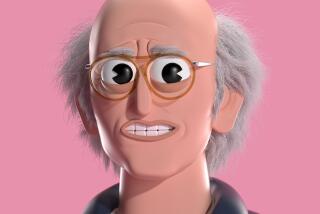For ‘Uncle Miltie’s’ Generation, Television Just Isn’t What It Used to Be
Now and then, according to informed sources, residents of Hollywood’s DanMar Retirement Villa argue about what shows to watch on the big-screen TV in the lounge.
Some insist the television should stay on ABC all the time so there’s no switching necessary when “Wheel of Fortune” and “Jeopardy!” come on. Others prefer more variety. There does seem to be a consensus, however, on one thing.
TV ain’t what it used to be.
Sid Balkin throws his hands up when I ask if anyone wants to talk about Milton Berle, TV’s first superstar, who moved into another kind of old folks home last week at the age of 93.
“I was in the TV business,” says Sid, who is the youngest 90 you’ll ever see. “We couldn’t get enough TVs into the shop when his show was on.”
Sid is talking about Berle’s “Texaco Star Theater,” which premiered in 1948 and created a mad demand for this new invention called the television.
The salesman from Motorola would come by Sid’s New Jersey store and promise a greenback or two for every set Sid sold, so he pushed Motorolas and pocketed a nice buck.
When he went home on Tuesday nights, the streets were empty and houses were aglow, families gathered around the miracle of projected light.
Billy Wilder followed Milton Berle out of town last week at age 95, giving DanMar residents another marker by which to chart their own journey.
“‘Some Like It Hot,’ ‘Double Indemnity,’ all his movies were remarkable,” Sid says, drifting back on black-and-white memories. “But look, we all get older. We get older and then we gotta go. We got appointments.”
Sid offers to escort me upstairs, where the trivia class is about to give way to an exercise class. I grab a copy of a newspaper called Not Born Yesterday off a table and see a story on a piano teacher who retired at the age of 100. A Page 1 headline announces: “Lawrence Welk Alumna Jo Ann Castle Boogie-Woogies at Palm Springs Follies.”
The trivia query of the moment concerns the date of D-day. Two men who might have landed at Normandy are of no help--they’re fast asleep. But a dozen players, seated in a semicircle, are hot to drop the game in favor of sharing memories of Berle and the appliance that changed their lives.
Sandy Ziegler, who grew up in Inglewood, raises her hand.
“I was the first one on my block to have a television,” she says, as excited as if it were yesterday. Sandy says they got the TV just to see Milton Berle.
Same here, says Eva Zipperman, who grew up in a two-bedroom apartment on Guthrie Avenue in West L.A.
“People in the neighborhood came over to watch because they didn’t have televisions yet,” Eva says. They brought their own candy with them sometimes because it was like being at the movies. “It was a crowded house, and that was fine with me.”
Anne Levinson raises her hand and says she has something to share about Berle. She begins by describing bitter cold winters in upstate New York, and a mother who toiled her entire life. And then she says of Berle:
“I felt very sad that he died. Life was hard, but he helped us through it with his humor, and it drew out the sense of humor in us.”
Mathilde Bachrach now leads us on a stroll through the Hollywood cemetery, rattling off the names on all the fresh headstones: Berle, Wilder, Jack Lemmon. When she gets to the last one, a woman gasps.
“Jack Lemmon is gone? I loved him!”
“Oh yes, he died,” Mathilde says. “Last year, or maybe last month.”
Don’t forget Dudley Moore, another woman says.
“There won’t be any replacements for some of these people,” Eva says, and everyone’s on board with that notion. “Milton Berle was a hell of an entertainer as far as I’m concerned. Let’s put it that way.”
The question of just what Milton Berle started will of course be dissected long after all of us are in the ground. Has television made us smarter or dumber? Has it piqued our imagination or anesthetized it? Has it brought families together or driven them into silence? Has it wrought violence or merely reflected it?
But when I ask if anyone in the room has any regrets about how many days of their lives were spent on television, the answer is unanimous. Everyone says no.
“It was thrilling,” Mathilde says, especially at first. “It was such a big change in our lives. We became aware of many things we didn’t know about. I watched FDR’s funeral on television.”
As for Milton Berle, not everyone in the room loved his vaudevillian, cornball slapstick, but they loved the innocence. It was clean, honest fun.
“Now they’ve got trashy shows that are bad for children and unentertaining,” says Mathilde, who wishes the ABC crowd in the lounge would quit being so selfish. “Can’t we just watch A&E; once in a while?”
“They’re giving more money away now on ‘Wheel of Fortune,’” Eva says, explaining the unshakable ABC support.
Mathilde says parents used to write to “Uncle Miltie,” complaining that their children refused to go to sleep when his show was on. “‘Children,’ he would say, ‘listen to your parents. Go to sleep.’”
Milton, listen to your fans at DanMar Retirement Villa in Hollywood.
Thanks, and sleep tight.
*
Steve Lopez writes Sundays, Wednesdays and Fridays. Reach him at [email protected].
More to Read
The complete guide to home viewing
Get Screen Gab for everything about the TV shows and streaming movies everyone’s talking about.
You may occasionally receive promotional content from the Los Angeles Times.







